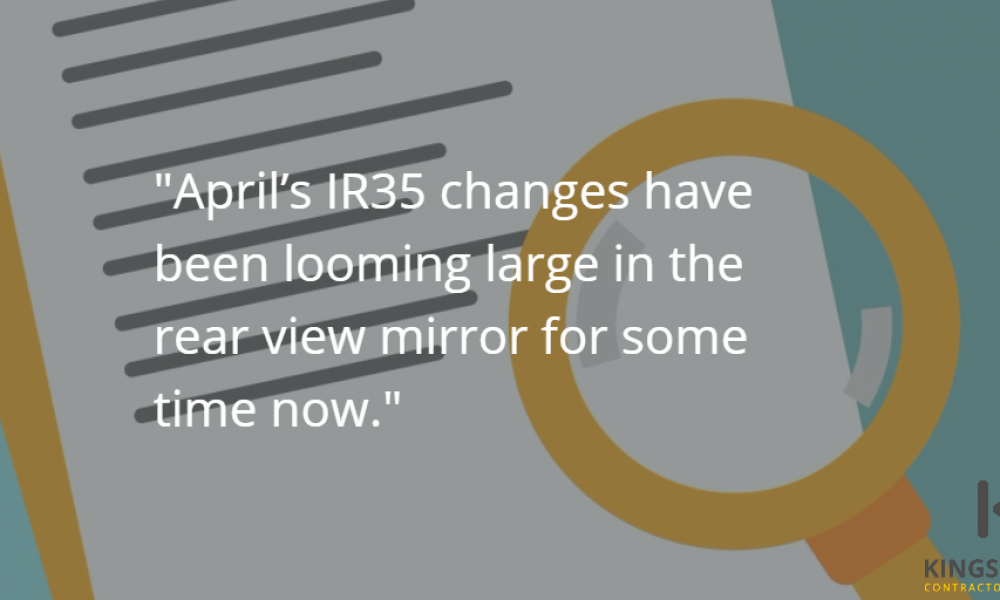April’s IR35 changes have been looming large in the rear view mirror for some time now. With the self-assessment deadline having come and gone at the end of January, the focus of the contracting community has now fallen firmly upon Philip Hammond’s Spring Budget on 8th March, followed swiftly by the much-maligned changes in IR35 status for personal service company contractors in the public sector that are due to come into force from 6th April 2017. If labyrinthine policy change doesn’t fill you with vernal optimism, then we’re not sure what will.
With speculation and comment converging with fact it’s easy to be a little confused about what exactly lies ahead. Essentially, PSC contractors working in the public sector will lose their say on whether they are caught by IR35. Official documents published in December confirm that the responsibility to pay tax if the Intermediaries Legislation applies will move from the worker to the staffing agency or third-party who pays them.
These changes have already led to some sweeping proclamations from public sector companies, not least Transport for London, who have banned PSC contractors from working for them in anticipation of the change (“We won’t allow limited company workers to continue working for us,” they noted in a recent internal memo revealed by ContractorUK.) Whether they follow through on that remains to be seen, but it nonetheless reflects the poisonous atmosphere circling around the changes like a heavy cloud.
As Thomas Wynne, Business Development Director at Kingsbridge, recently noted: “It has already been shown that blanket bans or placing everyone ‘caught’ is short sighted and not a feasible solution. Kingsbridge are working with recruitment businesses to ensure that they are suitably protected when engaging contractors outside IR35 in the public sector.”
The vagaries of government legislation being what they are, we know that IR35 and any associated reform can be hard to follow. To make things a little easier we’ve outlined a few of the best pieces of commentary and advice from around the web that we’ve read recently. We found these useful. Hopefully you will too.
IPSE, the Association of Professionals and the Self-Employed, warned contractors working in the public sector to send their invoices before 6th March, and to receive any payments due before 5th April due to the likelihood that “all payments from public sector clients could be made via the Real Time Information (RTI) system, which is typically used for employees.”
IPSE Chief Executive Chris Bryce went on to note: “We have little faith in public sector organisations making an accurate determination of contractors’ IR35 status. Some aren’t even going to try. Instead they will put all contractors onto the payroll, without even considering whether this is the right arrangement. That’s why it is critical that contractors are aware of the fast approaching deadline.”
Susie Hughes at Shout99 recently revealed that HMRC had met a number of large agencies, public sector representatives and freelancer groups to discuss the proposed new public sector IR35 rules, as well as giving them the opportunity to comment on the latest version of their planned onlinetool (more information on which can be found here.)
Notwithstanding the fact that HMRC still seems to be unsure of its approach to IR35 less than two months before launch, Adrian Marlowe, Chairman of the Association of Recruitment Consultancies noted that: “…the problem is that the test of employment status under IR35 is too complex to provide certainty, which is what is needed. This itself leads to tax avoidance. Instead of hanging on to old, ‘tried and failed’ legislation, the core legislation itself should be simplified, removing ambiguity and potential for conflict.”
For those searching for a more straightforward interpretation, last week HMRC published a set of guidance notes for personal service companies likely to be affected by the reforms, alongside a broader overview of IR35 reform in general and a guide that outlines how fee-payers – a “public authority, agency or other third party,” are likely to be affected by the forthcoming changes. The guidance set is finished off with a briefer note outlining the procedural steps that public authorities must take when engaging with a PSC. That can be found here.
If the above is too much to take in (and we don’t blame you if you’re finding it tough) the good people at ContractorUK have put together an excellent overview. Could public sector limited companies be taxed retrospectively? Is there anything contractors in the public sector can do to protect themselves against a retrospective investigation? Find answers to those burning questions and more.
Of course, it’s impossible to truly and accurately predict the impact these changes will have until they come into effect on 6th April. Many have questioned whether such reform is necessary, and many more have become exasperated by the disregard shown towards the contracting community despite its rapid growth and outstanding contribution to the British economy. The question remains – is IR35 reform going to be easily understood, and adequately managed? For now, at least, it would seem the answer is a resounding, and rather complex, “no”.
